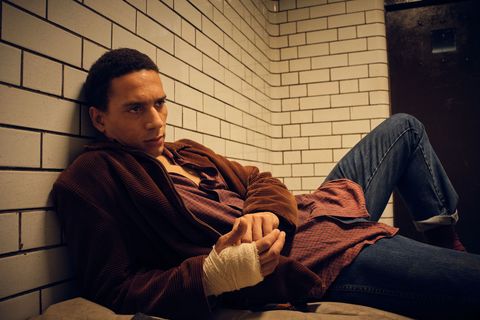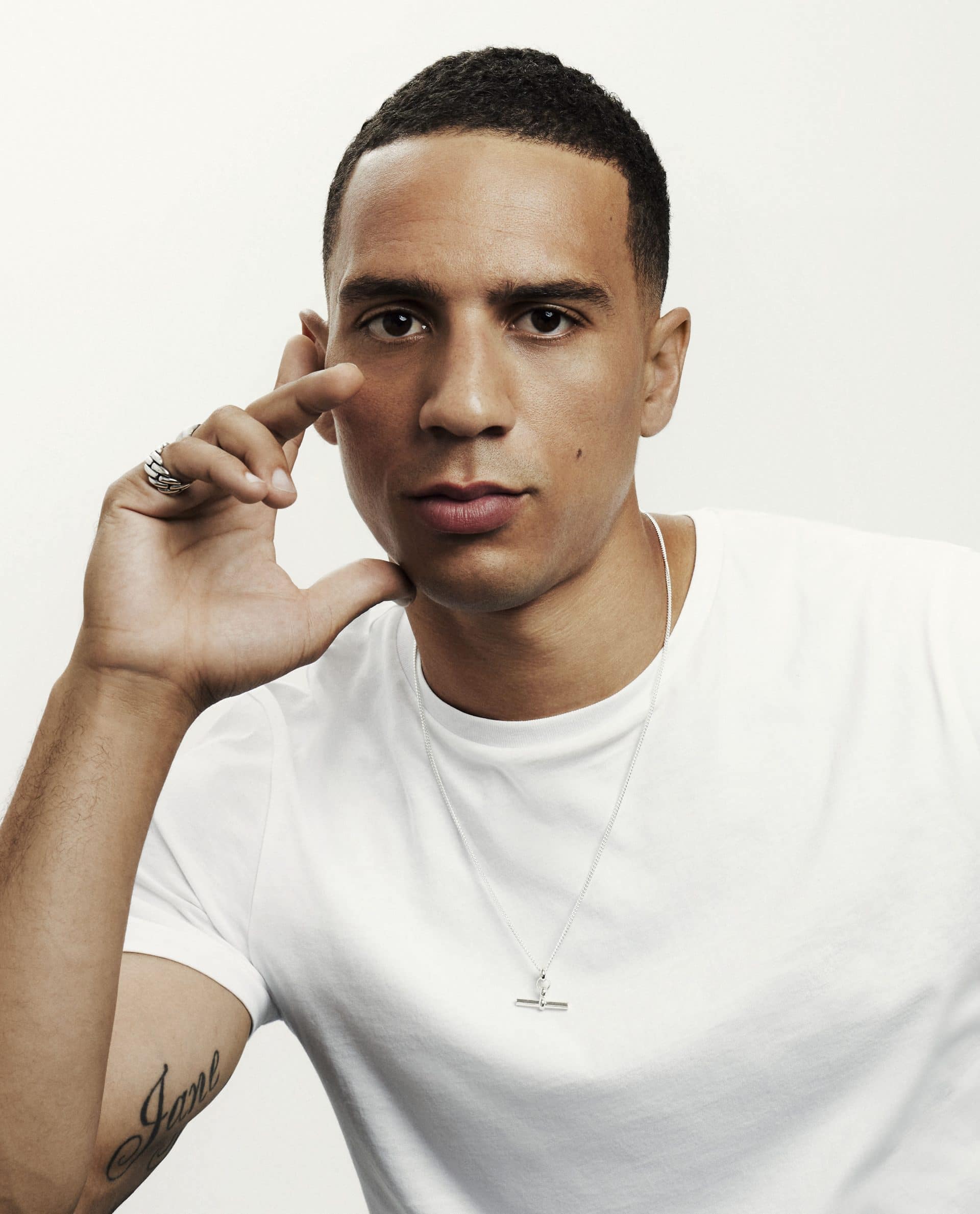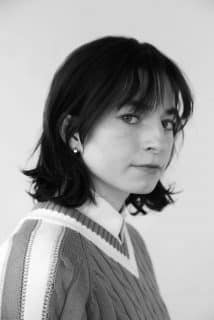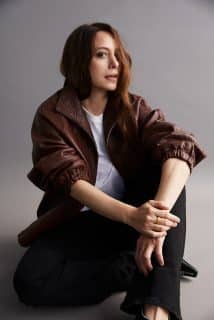Gabriel Akuwudike on Ridley Road
Culture
Gabriel Akuwudike talks to us about the excellent BBC drama Ridley Road and why its story about fascism in the Sixties resonates today.
Ridley Road has been one of those dramas that truly knocks out your complacency as a viewer – it is a revelatory, and shocking, rise of neo-Nazis in the 1960s and the anti-fascist 62 Group who infiltrated and tried to stop them. Written by Sarah Solemani, it’s a truly gripping watch that makes you immediately want to find out more about this period. One of the standouts in the cast is Gabriel Akuwudike, who plays Stevie, a charismatic student who both suffers at the hands of oppression and recognises he must act to end it. Gabriel is the young Londoner who you’ll soon be seeing a lot more of, with roles in Amazon’s ‘Hanna’ and a new Netflix film about the Homeless World Cup called ‘The Beautiful Game’. In our interview with Gabriel it was clear that here’s a unique and intelligent talent who, like his character in Ridley Road, has a depth of understanding about the world and is determined to make a difference in it.
How’s the response been to Ridley Road?
The response has been amazing. They’ve had the opportunity to kind of watch it at their own pace. And people’s responses have been saying the same thing really like, ‘Oh my God, I didn’t know this happened.’ And that was kind of my response to reading it in the first place. The great, brave 62 Group. I think it’s so powerful for now.
I’ve been looking through Twitter, and seeing Eddie Marsan get loads and loads of really positive responses out there. People who have been speaking up on anti-semitism, and-anti racism. I think it’s a really important story, and obliterates the binary moment that we find ourselves in, where if you believe one thing, you’ve picked your side. I think people have been stimulated to go and look at that period in history or look at themselves.
Since it was a true story did you do a lot of research?
I read as much as I could in the time, a lot of articles online. But mostly I watched a lot of videos – for me, seeing visual representations of the time was important. To see what people’s attitudes towards racism and people’s attitude towards politics. I didn’t want to carry too much of today’s politics into it, I wanted to try and see what the what the politics of the time were. And I found some really interesting things. Lots of archive footage of people around my area, actually, where I grew up in Homerton. There were loads of workers around Leyton being questioned on their opinions. And lots of white working class people that had lots of very progressive ideas about racism, very human ideas about racism, where they couldn’t see why anyone should be treated any differently.
What really struck me was someone like Colin Jordan [the fascist leader played by Rory Kinnear in the series] actively trying to turn people’s minds, using Jewish people, black people, Asian people, as scapegoats for what the downtrodden people in this country were going through. All of that stuff was really eye opening.
The series really shows how people can be manipulated, and that kind of thing is still around, as any dip into social media will tell you…
For sure, yeah. I think that’s what is really beautiful about the way Sarah wrote it. She really humanises it. Human beings have traits that can be manipulated, and that continue to be manipulated. Going back and looking at things honestly, can help us to see that. To say, ‘wait a moment now, we’re all susceptible to being manipulated in a certain way’. If people can really value and hold on to the truth in amongst all that, you hope and pray that we’ll be alright.
There’s that brilliant line that you have at the end of the series – “we’re not all the same, but maybe we’re all fighting the same fight.” That must have an important one for you to deliver.
Yeah. I think Stevie as a character is someone that I felt had an enormous amount of pathos about him. I was struck by how lonely he must have been, in his experiences. To be out there fighting the fight that he is, with courage. And I think his story is one of growth within. He finds himself in a position where he’s taking action in the direction of what he believes in. And I think that line culminates it. He wouldn’t forgive himself he didn’t do anything about it.
That felt like a vital part of his character. He would fight tooth and nail to stop oppression from happening on his watch. Taking whatever actions you can take in order to make some sort of impactful change.
There’s also great defiance in him, a certain swagger to him – what were some of the other things that you wanted to put into the character?
Although he could be considered someone who’s downtrodden, he’s also someone who loves to look good. He loves to dress well, he loves to read, he loves to meet people, and I think ultimately he’s someone tries to see the good in people, as when he meets Vivian. I really think there’s a purity that hopefully comes through. If there’s someone there to be helped, then he’ll do his best to do so. I think it means so much to him that the people around him are not apathetic. There’s the scene where he’s really trying to activate Vivian, and I think that is a large part of his life as well. I think this really resonated with me, when today there is all this injustice going on around us. If it’s not affecting us, it can be very, very easy to feel like ‘oh, that’s going on over there. I don’t need to make a change in my life, or investigate anything within myself.’ I think that’s a very potent thread of the show, shown in the brilliant speeches that Eddie has about being an anti fascist. And that statement means a lot to me. And for me is at the heart of the show – what can we do as individuals?
How was the actual filming? A brilliant cast, but quite a heavy subject, did it make for a different sort of atmosphere on set?
There was a really lovely atmosphere. And I think a large part of that was the director, Lisa Mulcahy. And Sarah – although Sarah couldn’t actually be there on set, she really made an effort to reach out to members of the cast and make sure that we were okay with the lines that we were saying. A lovely atmosphere came from that. And then the beauty of it is that a lot of us in the cast were all on location together. So we saw quite a lot of each other, all these amazing actors, in costume, seeing them work. It was a really brilliant way of visualising the characters and making what before are just lines on the page, into a living and breathing thing. It was a lovely, lovely atmosphere, and a collaborative process. We were all sort of pulling in the same direction and all flabbergasted by the story that we were telling.
When you’re watching other actors work in these kinds of situations, and especially some of the older cast, is it useful from an educational point of view as well?
I think that’s really important to hold on to. I’m still in the pretty early days of my career, and one of the things I really love about the whole process of filming is learning from people. Not just the older members, although they were incredible, but anybody. Aggie was on her first job, and she was fucking brilliant. I think any actor that is in front of me, I can learn from them. That’s something I value, keeping a sense of humility, that the human in front of me working is my teacher.

Can we just talk about some other things as well that you’ve got sort of coming up? Like ‘Hanna’, and ‘The Beautiful Game’, can you tell us about any of those?
Hanna is coming in November I think. I can’t talk huge amounts about it, but that was a really exciting project to be on. It’s the final season, and is really drummed up – the story on it is bigger and more bombastic than last time. There’s some amazing people in it too – Ray Liotta walked into my trailer and my jaw dropped to the floor. He’s got a real presence. I’m really looking forward to people’s people seeing that. And ‘The Beautiful Game’ is a project that’s really, really close to my heart. Again, it was something I had no idea even existed, the Homeless World Cup. I think it’s going to be a beautiful film, with a really lovely cast. It was great to hang out with Michael Ward, Kit Young, Bill Nighy, it just felt like such a tight knit group telling the story about the England Homeless World Cup team. Being a part of that was a real pleasure.
With the streaming services is there a lot more work and more variety of work for you?
Yeah, with the streaming services it just seems like there’s more and more every day. There’s so much stuff being made. It’s really exciting to be an actor at the moment. That being said, I do hope cinema still has its place, because I think it’s such a wonderful medium. Hopefully the two can coexist. There’s nothing quite like the big screen experience, you know, being locked in a room with a film. But I love the streaming platforms too – Squid Game is like nothing I’ve ever seen in my life.
It’s amazing. What first made you want to get into acting?
I was quite an ADHD child. I wasn’t very good in the classroom. The two things that I really enjoyed during school, were acting and sports. Two things that were very physical and practical, where I was doing something. I decided when I was about 19 or 20, that I wanted to be an actor. And I started going to the Weekend Arts College in Belsize Park with Che Walker, where the classes were for £1.50, every Sunday. Really high quality acting classes. It fostered that idea of being able to grow, session on session, month per month, year on year. I learned things like, ‘I should connect a little bit more with the person opposite me. And can I get a little bit more out of them.’ It was a really interesting route to go down. And then I found myself at drama school a couple of years later, which was just a continuation of that. I hope that I keep that same thing in my heart, one of, can I get a little bit more? Can I be there a little bit more for that person? Because that’s the thing that I really, really value about it. That connection. Look, my dad’s an actor, my mom’s an actor, so I it around me from quite a young age, but the finding and fostering my own relationship to it has been really, really important.
How do you look after yourself away from sort of acting, and keep healthy and happy?
I think through my experiences I have to be honest with myself about what’s good for me, and what’s good for me sometimes might not be the most comfortable thing to do. I often find doing the uncomfortable thing is often the thing that in the long run will make me feel good, or will bring me a sense of peace.
I see a therapist regularly, which is amazing. It’s just about being open to my feelings, open to the ability to switch what my perception might be. Sometimes I can feel really sad, and that’s okay. And other times I can feel really great. Having a sort of baseline gratitude is really important to me. It feels like I’m oversharing!
No, that’s great that you use a therapist, and does that help in your profession when you have a lot of emotional demands in becoming characters?
Yeah, I think so, and also allowing myself to separate from the character. If Gabriel’s doing well, and at peace with himself, then I’m going to do a better job when it comes to playing the character, because I’m not going to be colouring it with all my own shit. And I think that is part of that quest, that journey. To get that utmost connection to the characters I’m playing, and find the most truthful and honest form of storytelling.
All episodes of Ridley Road are available now on BBC iPlayer
Trending

Join The Book of Man
Sign up to our daily newsletters to join the frontline of the revolution in masculinity.

















